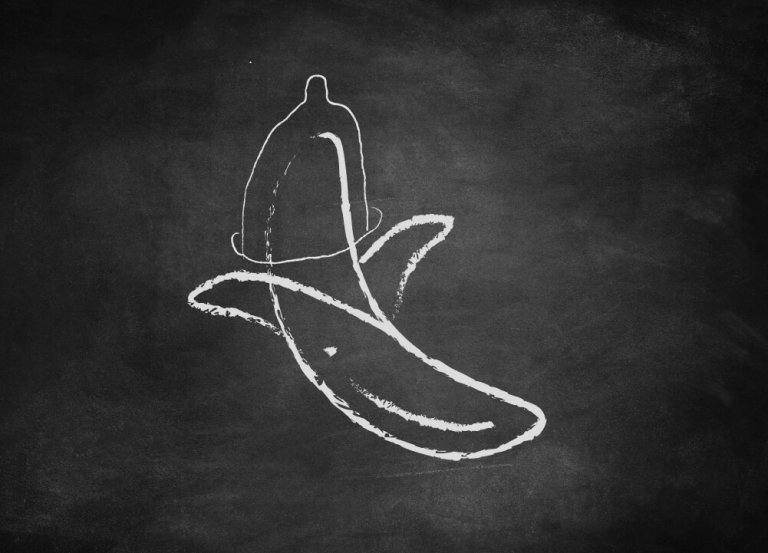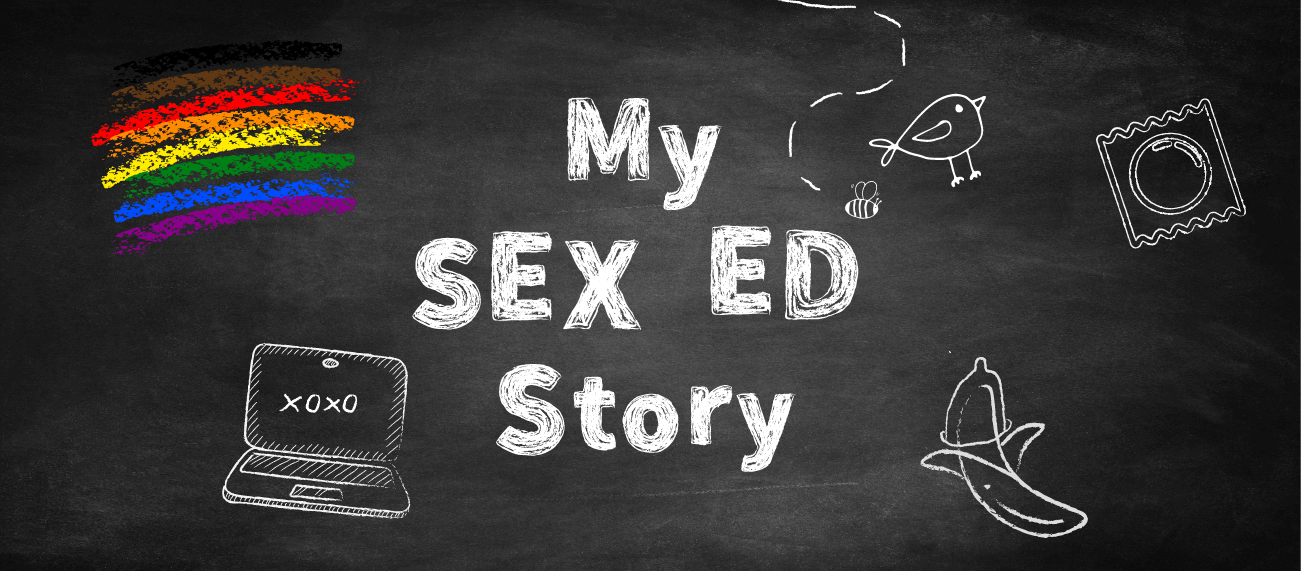My Sex Ed Story
We look beyond the classroom to see where people are really getting their sex education from.
Where did you get your sex education from? Did your parents awkwardly leave a book about the birds and the bees on your bed and never mention it again? Did you learn from your peers – and later realise most of it was wrong? Or did your maths teacher try to teach you the anatomy of a penis while you cringed behind your pencil?
More than 3 in 5 (61%) of 18-35-year-olds don’t feel that their school sex education helped them make informed decisions about sex and relationships in later life, according to ellaOne’s 2019 survey* More than 4 in 5 (83%) of the same respondents said they felt their sex education was ‘purely biological’, while 46% said they wished they’d been taught about emotional wellbeing.
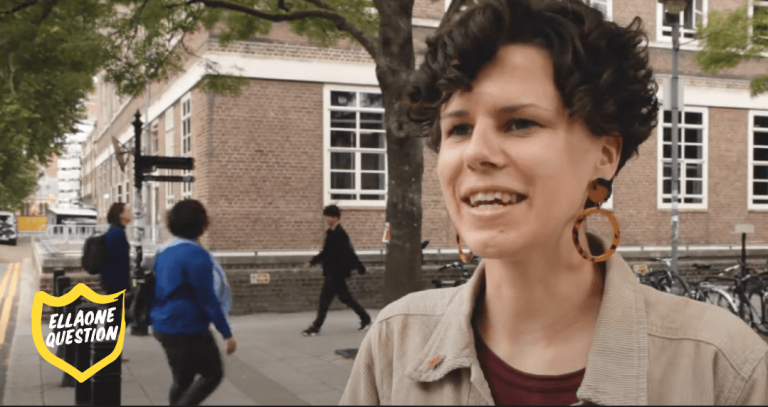
The theme for this year’s Sexual Health Awareness Week is Get Your RSE in Gear, which celebrates inclusive and inspiring Relationships and Sexual Education. As RSE is becoming compulsory in English schools this September, this week aims to deliver educational resources to ensure all young people get up-to-date sex education that covers diverse gender identities and sexualities. This is done by empowering teachers to deliver better RSE.
To highlight the importance of this week, we spoke to a range of people who have left school and asked them about their sex education. Read on to find out what they said!
Millie Evans, 20, Journalist
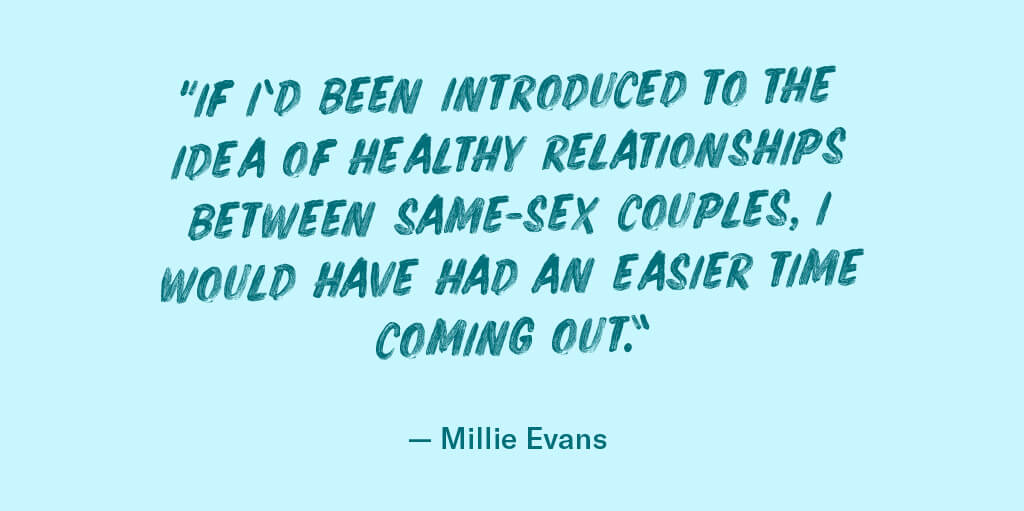
I went to an all-girls grammar school and had 5 dedicated sex ed lessons in my seven years there. None of them really touched on gender or sexuality at all. The only mentions we had of LGBTQ+ relationships were in religious education where we were told to debate gay marriage and adoption for same-sex couples.
Perhaps if I’d been introduced to the idea of healthy relationships between same-sex couples, I would have had an easier time coming out, overcoming my internalised homophobia and been able to identify my sexuality earlier. That, in turn, might have prevented several very unhealthy relationships with men which I thought were normal because much of the narrative at school was that it was normal to be unhappy or dissatisfied in your relationships.
I certainly didn’t learn anything about queer sex and most of my learning on that came online, whether through porn, genuinely helpful sex-ed resources like BISH, Brook and Sexplanations and What’s My Body Doing on YouTube. My parents were my main source of sex ed because their jobs in the sex toy industry meant that we could have very open and honest conversations. But that, in many ways, didn’t make up for the lack of LGBTQ information at my school.
Gayathiri Kamalakanthan, 27, Education Lead at Decolonising Contraception
I started my period age 10, before we actually had any Sex and Relationship Education (SRE). I was frightened that I had done something immoral and told my best friend at school about the blood. She brought me one of her mum’s pads and showed me how to use it in a tiny cubicle in the girl’s toilets. Then after that first week, I told my family about ‘the period.’
SRE at school was heteronormative, awkward and minimal. I watched the teacher put a condom on a condom demonstrator, but still didn’t know how to practically put one on or advocate for one being worn by my partners till my mid 20s. Even more essential than practical information on contraception and protection, is validation and permission to talk about sex and relationships without fear or embarrassment.
We should have been taught that being confused about your sexuality, gender and identity is normal. That you’re allowed to be curious, to change and explore yourself and other people with their consent. Instead, we were taught that ‘when a man loves a woman, he puts his penis in her vagina.’ There is soooo much wrong with this sentence, but it’s what I was raised on. SRE is political.
It’s about our identities, about power in the world and how it is distributed. It’s also about whether we are allowed to exist by law (as a nonbinary person, not at the moment), and whether we are embraced and accepted by society and ourselves.
I’m currently doing a lot of thinking and workshop programming on BPOC nonbinary identity. EG, Gender non conforming people have always had a place in South Asian and Hindu culture. Unfortunately, due to colonisation, South Asian’s have absorbed an imported homophobia which runs deep within mindsets. The new statutory guidance for Relationships and Sex Education released by the British government in 2019 states that LGBT+ identities should be taught at a ‘timely manner’ and when schools deem it ‘appropriate.’
This queerphobia, alongside current so-called ‘debates’ around much needed revision to the Gender Recognition Act makes Britain a hostile and isolating ‘home’ for all queer folk like myself. Decolonising Contraception and Sexplain (who I work for) are delivering inclusive and intersectional SRE which goes beyond the SRE guidance. This, in my opinion, is absolutely essential.
Rio, Male Escort
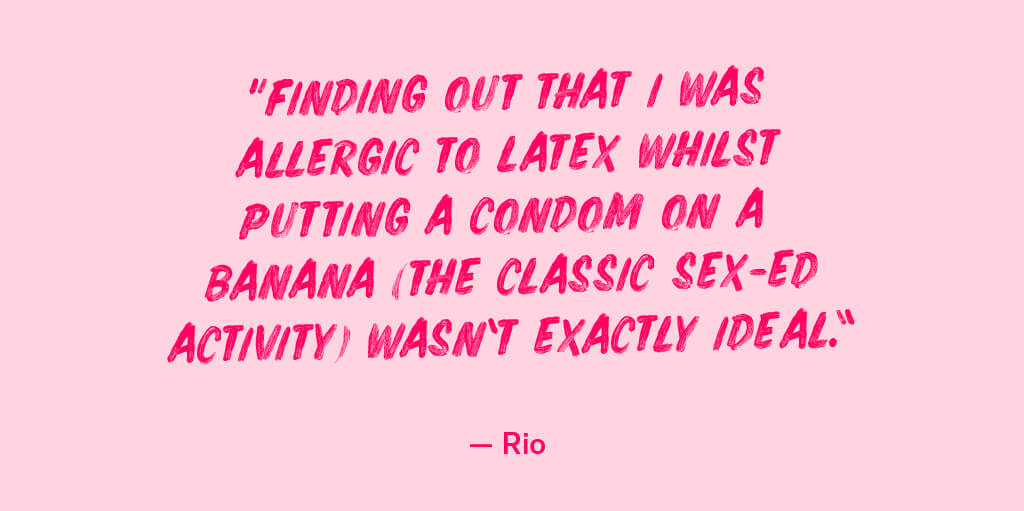
As an LGBTQ+ man my first sex-ed experience certainly wasn’t everything I hoped it would be. I went to a Catholic school so in many ways being taught about sex to any degree was a miracle!
It still wasn’t LGBTQ+ inclusive and finding out that I was allergic to latex whilst putting a condom on a banana (the classic sex-ed activity) wasn’t exactly ideal. Latex-free condoms weren’t widely available or cheap back then so I didn’t know how to handle it – some guidance would have been invaluable.
Surprisingly, my most genuinely informative sex-ed experiences have come through my life as an escort and ambassador for Ennvy, an online escort directory. I’ve met some fascinating people who are happy to openly discuss sex, LGBTQ+ relationships, sex toys and protection.
I’ve been lucky to find such a wonderfully inclusive community. It’s helped me to learn more about both myself and my sexuality which my traditional sex-ed experiences failed to do. I hope that one day every single sex-ed experience will be as inclusive and open-minded.
Matilda Lawrence-Jubb, 26, Co-founder of Sex Education Program Split Banana
My best sexual health advice has always been from the sexual health clinics I’ve been to. I’ve always preferred going to walk-in clinics rather than my GP as the nurses and doctors at the clinic are always SO lovely and happy to answer questions. They’ve given me the best advice about contraception – strengths and weaknesses and about having to search around for the right one for your body.
Harriet Marsden, 28 Freelance Journalist
My sex education – at what was then the best girls’ schools in the country – consisted of learning how to put a condom on a test tube.
It was woefully inadequate. We didn’t even learn about female anatomy. We barely learned about menstruation and how it might affect our bodies, moods and hormones. There was nothing on masturbation, nothing on same-sex attraction, nothing on contraceptive options outside of condoms, nothing on consent or rape or even sexual positions.
As a teenager, I turned to my (equally ignorant) girlfriends for advice. I learned more sex education from TV and films than anywhere else. No contraceptive, no foreplay, one position and go until the man comes. The end.
Elyssa Rider, 27, Education and Wellbeing specialist at Brook
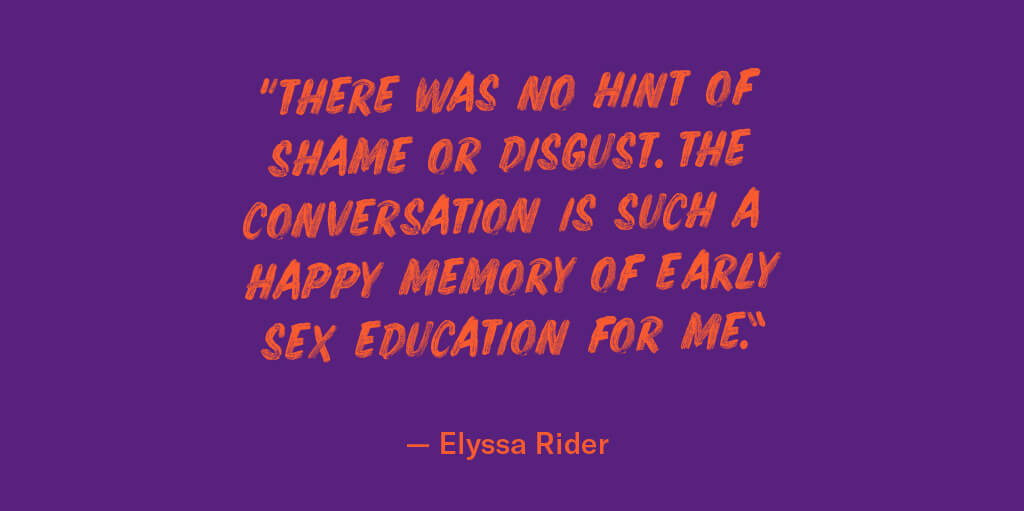
My parents were very proactive in talking to me about sex as soon as I asked ‘where do babies come from?’, but they didn’t really speak to me about masturbation. This came from my childhood best friend’s mum who was very open, honest and sex positive – she’s actually a sex therapist these days.
My best friend used to stand on one leg with her legs crossed tightly together, clasp onto her vulva and hop up and down. I remember thinking it was because she needed the toilet, and checking if she was OK.
It wasn’t until we saw the word ‘wanking’ in an educational book that her mum had given us, that we went and asked about it. She explained that what my friend had been doing this whole time was ‘masturbating’, and she did it because it felt nice. There was no hint of shame or disgust. The conversation is such a happy memory of early sex education for me.
Dr Natasha Bell, Specialist doctor in HIV and Sexual Health
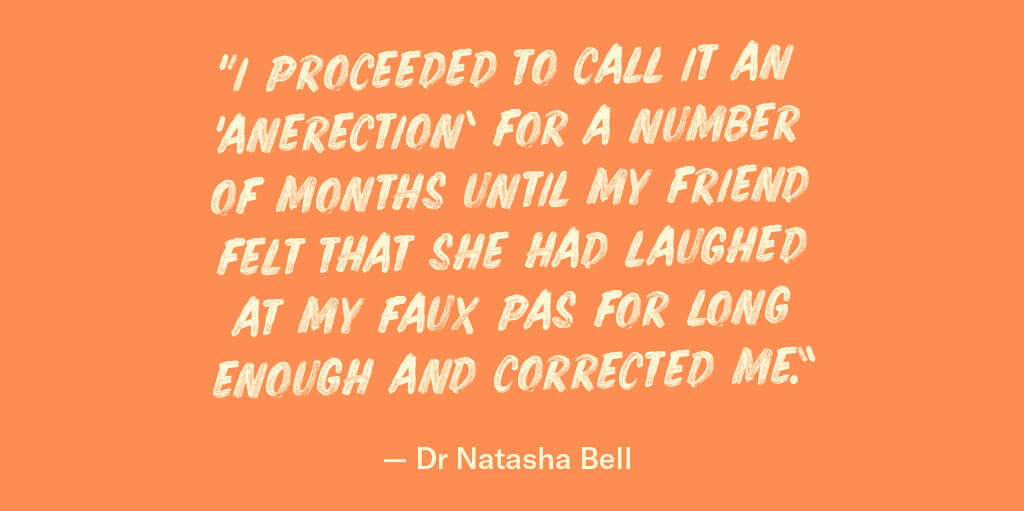
My best friend had older siblings and a super cool Mum who had given her a book which, us having read it and followed the flow chart at the end, concluded that we were “Clued Up Virgins”.
One day at school, we were cornered by a few of the older boys trying to embarrass/flirt with us and they asked if we knew what it was called when boys got a hard penis. I had no idea, but luckily my friend saved me the shame of not knowing by replying that of course we knew it was called an erection.
I proceeded to call it an ‘Anerection’ for a number of months until my friend felt that she had laughed at my faux pas for long enough and corrected me. This was just one of the many bits of essential knowledge she imparted to me. Now, of course, our roles are reversed and I’m the one dishing out the knowledge and advice!
Demi, 21, Trainee Sex Educator
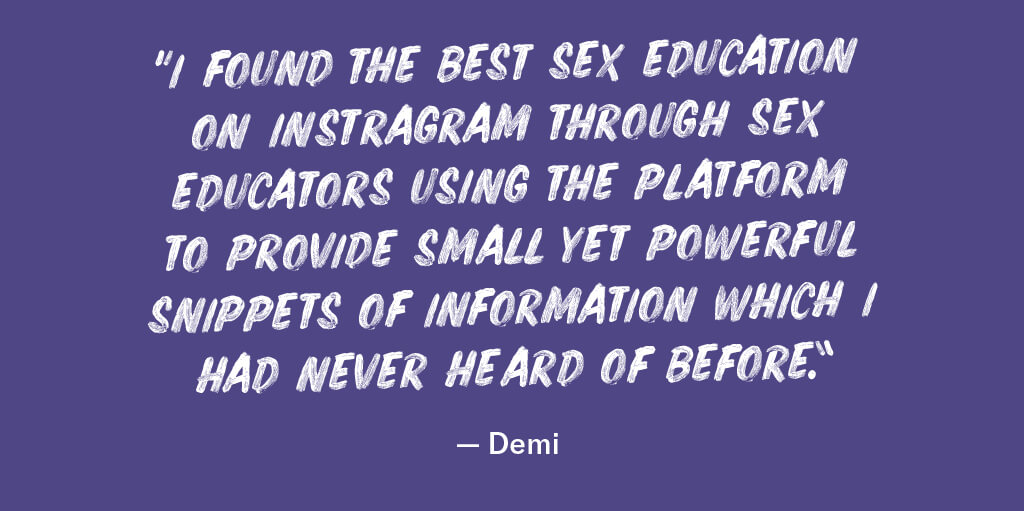
I found the best sex education on Instagram through sex educators using the platform to provide small yet powerful snippets of information which I had never heard of before. From the orgasm gap to how big the clitoris is, sex educators such as Hannah Witton, Brook and Ruby Rare provided a space that for many years had been closed off to me.
I was finally in a space of true sex-positive education and knew I had to replicate how I felt – this new found freedom – for someone else. That is why I started my own sex educational platform and podcast. Sex educators on Instagram make themselves vulnerable, placing themselves in the public eye to discuss topics which society is still afraid to publicly admit and I felt an instant connection with these educators.
Sex education should prepare young people to make informed decisions about sex and relationships – regardless of who they date and who (or if) they have sex with. We hope the new 2020 guidelines will make sex education more inclusive, but in the meantime, there are loads of reputable online resources which can help people of any age navigate this part of their lives.
We at ellaOne have a host of information about emergency contraception as well as sex, bodies and relationships. Click here to find out more. You can also find us on Instagram, Twitter and Facebook.
By: Sophia Moss
The healthcare professionals featured in this article do not endorse any products or brands.
ellaOne® 30mg film-coated tablet contains ulipristal acetate and is indicated for emergency contraception within 120 hours (5 days) of unprotected sex or contraceptive failure. Always read the label.
